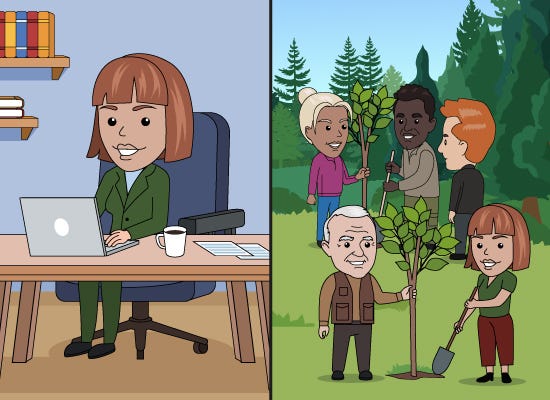Many people are pursuing second acts these days. Whether it’s post-retirement, a mid-career switch, or a transition after an initial foray into a profession, fewer and fewer people are pursuing a linear career path, let alone a singular one.
If you’re contemplating a move, you may be wondering where to start. Having made a pretty big career switch of my own from the world of high finance to the non-profit world and environmental activism, I’m often asked how I went about it. And while there are no one-size-fits-all answers, there are three concrete actions I think anyone can take to jumpstart the process.
Start small, but start now. Like most things in life, there’s never an ideal time. So if you’re serious about a move (or seriously contemplating one), the best time to start working on it is as soon as possible.
It’s a lot easier to do that if you start by thinking small. No matter how established you are in your existing field, you’re new to this new one. Why not think about volunteering? Get to know some NGOs; attend events; help out; become a donor if you can. It will help you get to know the actors, the issues, and the politics of the field. You also can make some new friends who can advise you on next steps.
Do the reading. Just like in college, too many people wing it. But don’t fool yourself — everyone can tell. And there’s really no excuse. It’s easier than ever to get smart about what is happening in a given field. I usually start with a few good books for a better understanding of complex issues (see here for the environmental ones I read to get up to speed). But there are also many great newsletters (I love Climate Tech VC), podcasts (Volts), and talks by experts on YouTube to help supplement and provide insight into current debates and challenges.
Determine how you will add value. Many people skip this step but it’s a crucial one. When you want to move to a new area or a new organization, you have to do more than announce that you are available. In all likelihood, organizations are not waiting for you, nor are they going to figure out why they should add you to their team. That’s your job. Based on the first two steps, you should develop a sense of where you can fit in and the gaps you can fill. Understanding your skills and thinking carefully about how they can be applied in different contexts is a skill of its own and worth honing.
I’ve personally found great fulfillment in my second career as an environmentalist. I’m very encouraged by the transitions I see others making. The benefit of more people crossing lanes is greater opportunity for cross-pollination of ideas from one sector to another. If those can be applied to some of the great challenges of our time, we all have a lot to be optimistic about.
Onward


